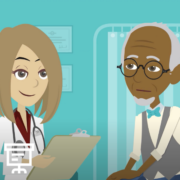How Could CLL Treatment Advances Benefit You?
How Could CLL Treatment Advances Benefit You? from Patient Empowerment Network on Vimeo.
Dr. Kerry Rogers reviews recent chronic lymphocytic leukemia (CLL) treatment advances and explains how patients may benefit from evolving research.
Dr. Kerry Rogers is a hematologist-oncologist at The James Cancer Hospital and Solove Research Institute. More about Dr. Rogers here.
See More From The Fact or Fiction? CLL Series
Subscribe to stay up-to-date in the latest information in CLL treatment
Related Resources

|

|

|
Transcript:
Patricia:
Excellent. What do you think about the future – how do you feel about the future of CLL treatment? What makes you hopeful?
Dr. Rogers:
Oh. Well, I think a couple things. One is for CLL, in many ways, the future is now, and I think it’s only going to get better from here on out.
So, a little less than a year ago, two very large clinical trials were reported that compared our best chemotherapy to oral targeted therapy with an ibrutinib-based regimen for CLL, and the oral targeted therapy was superior in terms of something we call “progression-free survival,” which is how long people were alive without their CLL coming back or causing problems.
So, oral targeted agents, which, in general, not – everyone’s an individual, so until you try a treatment, you don’t know what’s gonna happen, but in general, have fewer side effects than chemotherapy, are better at controlling CLL than chemotherapy, so that’s what I like to put in the category of “the future is now,” and I think it’s only gonna get better. So, we’re improving on our existing oral targeted agents with next-generation drugs that have slightly different side effect profiles.
We are also studying combinations of these drugs, and oral targeted agents, and monoclonal antibodies to try to make treatment shorter, to try to get remissions deeper, to really try to improve the quality of life of people taking these therapies and not just improve how long they live with CLL.
And then, for people that really have the worst of the luck with CLL that have really high-risk findings, that don’t benefit for as long as we’d like from oral targeted therapies, that their CLL comes back after a couple years on those, I think the most exciting thing is really CAR T-cell therapies and those cellular-based therapies that aren’t donor stem cell transplant because I’ve seen people who have really benefited from those who had terrible problems from their CLL before that, and I think that’s gonna improve quality of life for a very specific subset of our CLL patients.
That is still in clinical trials for CLL, but has been in enough of them I can feel very confident that we have an idea about what the side effects are and how well it works. So, that’s really exciting. Can I add just one more thing about this before I…?
Patricia:
Absolutely.
Dr. Rogers:
So, I saw a consult recently for a person that was recommended to start treatment for CLL. His questions for me were, “Should I start treatment now, and what treatment should I take?” This person had never had a treatment before. So, I agreed with his oncologist, who said that he should start treatment now, and his oncologist had talked about several options, but I think with some of the changes in what we’re recommending for CLL, his oncologist had also wanted him to come see me to get a recommendation too, so it was like, “Oh, that’s great. Why don’t you go see Dr. Rogers at Ohio State and see what you should do?”
And so, one of the things he had discussed with the two oncologists in his office closer to his home were, “Oh, we have these – we have ibrutinib, it’s a really outstanding oral targeted agent, but you’ve gotta take it for a really long time, so why don’t you just take chemotherapy, because I think something better will come along?”
And, I was like, “This something better. Literally, this was demonstrated to be better than the chemotherapy. Something better did come along, and it’s this.” So, ibrutinib is better than chemotherapy. I think the idea of “Why don’t we do a less effective treatment because something better might come along?” is not true anymore. We have something better. And, he actually decided to enroll in a randomized phase 3 trial that’s gonna set the new standard of care in CLL, so he was very excited to get treatment as part of a research study. I think he decided that was actually really important to him, and he really liked what the study was.
But, it was just – it was kind of like, “Maybe something better will come along.” I’m like, “Something did.” So, that’s kind of the nice position that many people with CLL are in now. There’s still a lot of work to be done in CLL, but I just get increasingly hopeful as therapies get easier to take and more effective.









